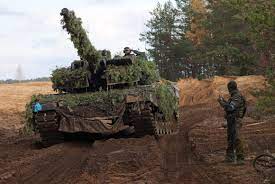German Chancellor Olaf Scholz faced rising pressure Tuesday from his European partners to authorise the export of Leopard tanks to Ukraine.
The issue will be one of the most pressing in the in-tray of newly-named German Defence Minister Boris Pistorius, a surprise choice for the vacant position who was unveiled on Tuesday.
Leaders and ministers from Finland, Lithuania, Poland and Britain have added their voices to a growing clamour for Berlin to greenlight the export of German-made Leopards to Ukraine.
Polish President Andrzej Duda reminded listeners at the World Economic Forum in Davos that Poland had offered to provide around 14 Leopards, but needed Germany’s approval to export them.
“We hope and we are trying to organise a bigger support for Ukraine,” Duda said in English, adding: “We hope that the producer of those tanks, Germany, will also participate in this, in my opinion, very, very, very good idea.”
Finnish Foreign Minister Pekka Haavisto also repeated Finland’s willingness to deliver Leopards.
“We hope that this decision (to deliver Leopards) will be made real, and Finland is definitely ready to play its part in that support,” he said during a sideline event at a Ukraine-themed pavilion.
The mayor of Kyiv, former heavyweight boxer Vitali Klitschko, wrote on Telegram that he had met with German Economy Minister and Vice Chancellor Robert Habeck in Davos on Tuesday to discuss weapons transfers.
“Positive decisions have been made. Good news is coming,” he wrote.
Scholz is set to deliver a keynote speech in the Swiss Alpine village, home to the annual World Economic Forum, on Wednesday at 1445 GMT.
Foot-dragging?
Russia’s invasion of Ukraine in February last year marked a big turning point in German defence policy, with Scholz announcing a 100-billion-euro ($108-billion) fund to upgrade the army, known as the Bundeswehr.
But the country has repeatedly tested the patience of allies, and drawn criticism from Ukraine, for its cautious approach to delivering weapons systems to Kyiv.
So far, Ukraine’s European allies have sent Kyiv more than 300 Soviet-era tanks since Russia invaded in February 2022, but Ukrainian President Volodymyr Zelensky is desperate for modern, Western-designed versions.
Earlier this month, France pledged to send its light six-wheeled AMX-10 RC tanks, making it the first country to promise a Western-designed tank.
The idea of supplying tanks had long been resisted by Ukraine’s Western partners out of fear that it would antagonise the Kremlin
The United States has since announced that it will deliver its powerful Bradley infantry fighting vehicles.
Britain announced at the weekend that it would provide its heavy Challenger 2 tanks.
British Defence Minister Ben Wallace noted a debate in Germany about whether tanks were “offensive or defensive weapons” but he said he would “urge my German colleagues” to at least give permission for Poland and Finland to re-export Leopards.
“If you’re using it (a tank) to defend your country, I would wager that it is a defensive weapon system,” Wallace told MPs on Monday.
Western countries supporting Ukraine are set to meet on the US-run Ramstein military base in Germany on Friday to coordinate their latest pledges to Ukraine.
Also speaking on Tuesday in Davos, Lithuanian President Gitanas Nauseda likened the war in Ukraine to a game of chess and suggested Germany needed to make a move now.
“I like to play chess. You have to take the move and others will follow. Someone has to take this leadership and take this decision to support Ukraine because the tanks become a very strategic factor of this war, especially now,” he said.
New minister
German Defence Minister Christine Lambrecht resigned on Monday after facing sustained criticism.
The final straw appeared to a widely panned New Year’s video on social media in which she lauded her “special experiences” as defence minister in 2022 against a backdrop of loud fireworks.
Scholz on Tuesday announced Boris Pistorius, a relatively unknown politician from his centre-left Social Democrat party from the state of Lower Saxony, as her replacement.
In May last year, he was forthright about Ukraine’s right to recapture territories taken by Russia, putting him at odds with many other Social Democrats who had been reluctant to endorse a counter-offensive.















































